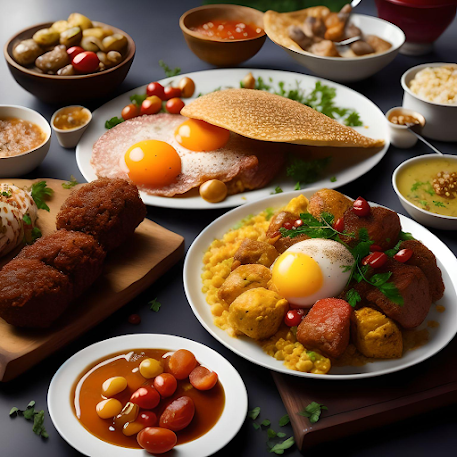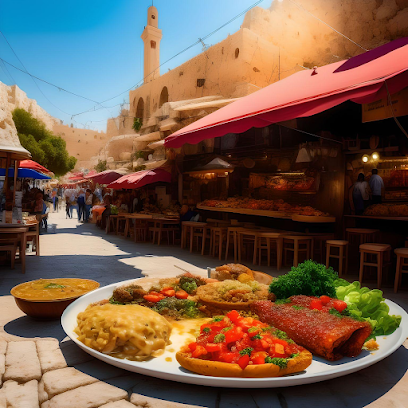Exploring the Culinary Delights of Israel: Unveiling Local Dishes and Unique Food in Jerusalem and Tel Aviv
Intro:
Israel, a nation rich in history and captivating culture. Presents travelers with an array of experiences beyond the realm of ancient structures and picturesque scenery. Remarkably diverse in taste, spice, and custom the culinary scene in this country is a fusion of flavors that embodies tradition. Each region takes pride in distinctive gastronomic treasures. Today. We embark on an exploration through the bustling streets of Jerusalem and Tel Aviv to uncover the true essence of Israeli cuisine. Join us as we delve into local dishes and unparalleled delicacies that transform these cities into havens for food enthusiasts.
Outlines:
- Jerusalem: A Fusion of Traditions and Flavors
- Tel Aviv: A Modern Gastronomic Hub
- Israeli Breakfast: A Feast Fit for Kings
- Jewish Cuisine: A Rich Tapestry of Traditions
- Fusion Flavors: The Contemporary Israeli Cuisine
- Conclusion
Jerusalem: A Fusion of Traditions and Flavors:
A Stepping into the ancient city of Jerusalem is like entering a treasury holding priceless historical gems:
,vibrant cultural treasures and mouthwatering culinary creations. Meandering through its labyrinthine streets and ancient alleyways unveils an exquisite mingling of customs and flavors that have been lovingly passed down through countless generations. Here are some irreplaceable delights you simply must savor when exploring Jerusalem:
1. Falafel: A Heartwarming Street Fare No journey to Jerusalem can be considered complete without surrendering to the temptation offered by the citys beloved street cuisine - falafel . From its irresistibly crisp exterior to its delicate interior; made with ground chickpeas or fava beans interwoven with fragrant herbs and spices - these deep fried balls of pure joy bring immense pleasure to your taste buds . Tradition dictates their presentation within a warm pita pocket alongside tantalizing accompaniments such as tahini sauce, pickles, and fresh vegetables. For a genuine sense of authenticity and a genuine taste of this celebrated Middle Eastern classic make sure to seek out the revered falafel establishments tucked away within the Old City.
2. Hummus: The Creamy Delight Another staple of the Middle Eastern cuisine that holds a special place in Jerusalem's culinary landscape is hummus. This creamy dip, made from cooked and mashed chickpeas, blended with tahini, olive oil, lemon juice, and garlic, is a true delight for the taste buds. The hummus in Jerusalem is renowned for its velvety texture and rich flavors. Enjoy it as a spread on warm pita bread, accompanied by fresh vegetables, olives, and drizzled with extra virgin olive oil for a heavenly experience.
3. Shawarma: A Meaty Indulgence Shawarma is a mouthwatering meat dish that has become synonymous with Middle Eastern cuisine. It consists of succulent, marinated slices of meat (typically lamb, chicken, or beef) that are slow-cooked on a rotating vertical spit. The tender and flavorful meat is then thinly sliced and served in a pita or laffa bread, along with various toppings and sauces. In the Old City, you'll find shawarma stands where you can watch the skilled chefs carve the meat from the rotating spit, adding to the overall experience of savoring this meaty indulgence.
B. Mahane Yehuda Market: A Sensory Delight A visit to Jerusalem wouldn't be complete without exploring the bustling Mahane Yehuda Market. This vibrant marketplace is a sensory delight, offering an array of sights, sounds, and smells that showcase the best of Israeli cuisine. Here are a few culinary delights to discover at Mahane Yehuda:
1. Local Produce and Spices Mahane Yehuda Market is a haven for fresh produce and aromatic spices. Stalls piled high with colorful fruits and vegetables create a visual feast, while the scent of herbs and spices permeates the air. Explore the market's alleys and interact with the friendly vendors who are passionate about their offerings. Sample the seasonal fruits, taste the local olives, and discover a variety of spices that add depth and flavor to Israeli dishes.
2. Halva: A Sweet Treat Indulge your sweet tooth with a taste of halva, a traditional Middle Eastern confection made from sesame seeds and sugar. The market is home to several halva stalls, offering an assortment of flavors and textures. From classic tahini halva to variations infused with chocolate, nuts, or spices, there's a halva for every palate. Grab a slice or two to enjoy as you explore the market or take some home as a delicious souvenir.
3. Malabi: A Creamy Dessert End your culinary adventure at Mahane Yehuda with a serving of malabi, a popular Middle Eastern milk-based dessert. This sweet and creamy pudding is made from a combination of milk, sugar, and rosewater, topped with a sprinkle of ground pistachios or coconut flakes. Served chilled, malabi provides a refreshing and light ending to your food exploration in Jerusalem. In Jerusalem's Old City and Mahane Yehuda Market, you'll find an abundance of flavors that reflect the city's rich history and cultural diversity. From humble street foods to traditional desserts, these timeless treasures will leave you with a deeper appreciation for the culinary heritage of Jerusalem. So, immerse yourself in the vibrant atmosphere, follow your senses, and embark on a culinary journey like no other.
Tel Aviv: A Modern Gastronomic Hub:
Tel Aviv, the vibrant coastal city of Israel, has earned a well-deserved reputation as a modern gastronomic hub. Its thriving culinary scene showcases a fusion of flavors, innovative techniques, and a celebration of local ingredients. From street food to upscale dining, Tel Aviv offers a diverse range of culinary experiences. Here are some highlights you shouldn't miss:
A. Street Food Extravaganza
1. Sabich: An Eggplant Lover's Dream
Sabich is a popular Israeli street food that has its roots in Iraqi-Jewish cuisine. It's a delightful combination of fried eggplant, hard-boiled eggs, tahini sauce, Israeli salad, pickles, and amba (a tangy mango sauce), all wrapped in a fresh pita bread. The contrasting textures and flavors of the ingredients make it a satisfying and tasty option for vegetarians and eggplant enthusiasts.
2. Shakshuka: A Breakfast Staple
Shakshuka has gained worldwide popularity and has become a staple in Israeli breakfast menus. This comforting dish features eggs poached in a rich tomato and pepper sauce, seasoned with spices like cumin, paprika, and chili. Served with crusty bread for dipping, shakshuka is a flavorful and satisfying way to start your day.
3. Burekas: Flaky Pastry Delights
Burekas are a beloved savory pastry that originated in the Sephardic Jewish communities. These flaky pastries are typically filled with ingredients such as cheese, spinach, mushrooms, or potatoes. Baked to golden perfection, burekas are a delicious snack or light meal option, perfect for enjoying on the go.
B. The Culinary Renaissance of the Carmel Market
Tel Aviv's Carmel Market is a bustling hub of activity, known for its vibrant atmosphere and a wide array of culinary offerings. Here are some highlights from the culinary renaissance happening within this market:
1. Fresh Seafood Delicacies
As a coastal city, Tel Aviv is blessed with an abundance of fresh seafood. At the Carmel Market, you can find an assortment of fish and seafood delicacies, from succulent grilled fish skewers to plates of briny oysters and plump shrimp. Don't miss the chance to savor the flavors of the Mediterranean Sea through the city's vibrant seafood scene.
2. Modern Israeli Fusion Cuisine
Tel Aviv's culinary scene thrives on innovation, and chefs in the city are known for their ability to blend traditional Israeli flavors with modern culinary techniques. From creative interpretations of classic dishes to unique fusion creations, the city's restaurants offer an exciting journey for food enthusiasts. Experience the tantalizing flavors of dishes that seamlessly combine local ingredients with international influences.
3. Artisanal Food Products and Crafts
Within the Carmel Market, you'll find a treasure trove of artisanal food products and crafts. From local cheeses and homemade preserves to handcrafted chocolates and freshly baked pastries, the market showcases the passion and creativity of local producers. Take the opportunity to sample these unique products and perhaps bring some back home as edible souvenirs.
Tel Aviv's culinary scene is a reflection of the city's dynamic energy and its fusion of cultural influences. From street food stalls to gourmet dining establishments, there is an endless array of flavors and experiences to explore. So, immerse yourself in the culinary renaissance of Tel Aviv, and let your taste buds be tantalized by the city's modern gastronomy.
Israeli Breakfast: A Feast Fit for Kings:
The Tradition of Breakfast Spreads
In Israels' culinary landscape. The importance placed on breakfast is unmistakable—and rightly so! The legendary Israeli breakfast spreads captivate hearts with their striking array of variety, freshness, and flavors. From freshly baked breads to an abundance of salads, dips, and dairy delicacies, a traditional Israeli breakfast is fit for royalty. Delve into the elements that shape this delightful morning spread:
1. Assortment of Freshly Baked Breads
At the heart of an Israeli breakfast lies a captivating medley of freshly baked breads—each tempting with its distinct texture and flavor. The options are plentiful: crusty baguettes, fluffy pita breads, and much more await to satisfy your cravings for carbohydrates. Noteworthy traditional bread types such as challah (braided egg bread) and rugelach (a sweet pastry) may also grace the table. Treat yourself by spreading some butter or labneh (strained yogurt) onto a warm slice of bread as you savor the simple pleasure of breaking it—a perfect way to commence your day.
2. Salads and Dips Galore
In the realm of Israeli cuisine. Vibrant salads and irresistible dips take center stage in a breakfast spread worth celebrating. Among the refreshing salad offerings is the acclaimed Israeli salad—a delightful melding of diced tomatoes, cucumbers, onions, and herbs dressed with olive oil and lemon juice. Unforgettable favorites like tabbouleh (a parsley and bulgur wheat salad) and roasted eggplant salad bless your palate with bursts of fresh flavors. Alongside these vivid salads lie a colorful assortment of dips—including hummus, baba ganoush (a smoky roasted eggplant dip). And tahini—a smooth sesame seed paste that enriches the breakfast spread with depth and indulgence. Indulge in this truly satisfying meal that showcases the true essence of Hebrew culinary excellence.
3. Cheese and Dairy Delicacies
Israel has a rich tradition of dairy products, and they feature prominently in the breakfast spread. Cheese lovers will rejoice at the variety of options available, from creamy and tangy labneh to soft and crumbly feta cheese. Tzfat cheese, a traditional Israeli cheese with a distinctive texture and flavor, is another popular choice. Pair these cheeses with freshly sliced vegetables or drizzle them with olive oil and sprinkle some za'atar (a fragrant herb blend) for an extra kick. You might also find cottage cheese, yogurt, and butter among the dairy offerings, providing a creamy and indulgent touch to the breakfast feast. Israeli breakfast spreads are not just about the food; they are a reflection of the country's culinary heritage and the importance placed on gathering and enjoying a meal together. It's a time to savor the flavors, bond with loved ones, and fuel up for the day ahead. So, embrace the tradition of a lavish Israeli breakfast, and experience the joy of starting your day like royalty.
Jewish Cuisine: A Rich Tapestry of Traditions:
Jewish cuisine is a rich tapestry woven from various cultural traditions and culinary influences. From the Ashkenazi heritage of Eastern Europe to the Sephardic flavors of the Mediterranean and North Africa, Jewish cuisine is a delightful amalgamation of tastes and traditions. Let's explore some iconic dishes from these two culinary branches:
A. Ashkenazi Delights
1. Gefilte Fish: A Classic Dish
Gefilte fish holds a special place in Ashkenazi Jewish cuisine. This dish consists of ground fish, usually a combination of whitefish, carp, and pike, mixed with onions, matzo meal, eggs, and spices. The mixture is then shaped into oval or round patties and poached in a flavorful fish broth. Gefilte fish is typically served cold, accompanied by horseradish or a tangy beet and carrot relish called chrain. It is often enjoyed during holidays and festive occasions, symbolizing the connection to Jewish heritage and the celebration of traditional flavors.
2. Matzo Ball Soup: Comfort in a Bowl
Matzo ball soup is a comforting and iconic dish in Jewish cuisine, particularly during Passover. Matzo meal, made from ground unleavened bread, is combined with eggs, oil, and seasonings to form soft and fluffy dumplings. These dumplings are then cooked in a flavorful chicken or vegetable broth, along with vegetables like carrots and celery. Matzo ball soup is a nourishing and soul-soothing dish that is believed to have healing properties and is often served as a starter during festive meals and family gatherings.
3. Rugelach: A Sweet Pastry
Rugelach is a delightful Jewish pastry that originated in Eastern Europe. These bite-sized treats are made by rolling a rich and flaky cream cheese dough around various fillings such as fruit preserves, chocolate, nuts, or cinnamon sugar. The rolled dough is then baked to golden perfection, resulting in a delectable pastry with a tender crumb and a hint of sweetness. Rugelach is enjoyed as a dessert or a sweet snack, and it has become a beloved treat in Jewish communities around the world.
B. Sephardic Influences
1. Shakshuka: A Versatile Dish
Shakshuka is a flavorful and versatile dish that has its roots in Sephardic Jewish cuisine. It consists of poached eggs cooked in a simmering tomato-based sauce with onions, peppers, and spices such as cumin, paprika, and chili. The combination of runny eggs and the rich, tangy sauce creates a harmonious blend of flavors. Shakshuka can be customized by adding ingredients like feta cheese, fresh herbs, or even sautéed vegetables. It is typically served with crusty bread for dipping and is enjoyed for breakfast, brunch, or even dinner.
2. Sabich: A Sephardic Twist
Sabich is a popular street food in Israel that originated from Iraqi-Jewish cuisine. It features a pita bread stuffed with layers of fried eggplant, hard-boiled eggs, Israeli salad, tahini sauce, amba (a tangy mango sauce), and sometimes additional ingredients like pickles and herbs. Sabich offers a harmonious blend of textures and flavors, with the creamy eggplant, tangy sauces, and fresh vegetables creating a satisfying and flavorful combination.
3. Sfenj: Moroccan Donuts
Sfenj is a traditional Moroccan donut that has found its way into Sephardic Jewish cuisine. These deep-fried treats are made from a simple yeast dough enriched with flour, sugar, and sometimes orange blossom water. Sfenj are typically light, fluffy, and crispy on the outside. They are often enjoyed as a sweet indulgence during holidays and celebrations.
Jewish cuisine is a testament to the diverse culinary traditions carried by Jewish communities throughout history. Whether it's the comforting dishes of Ashkenazi heritage or the vibrant flavors of Sephardic influence, Jewish cuisine offers a delightful journey through cultural and culinary heritage. So, savor the flavors, embrace the traditions, and experience the rich tapestry of Jewish cuisine.
Fusion Flavors: The Contemporary Israeli Cuisine:
Over time, Israeli cuisine has evolved by incorporating influences from various cultures while also incorporating innovative culinary techniques. In recent years, an emerging trend has been seen in the form of contemporary Israeli cuisine which combines different flavors with talents chefs' creativity leading to some interesting results. In this article we shall explore two main aspects associated with contemporary Israeli cooking.
A.. Farm-to-Table Movement One characteristic aspect consistent across modern-day Isreali cooking is their adherence towards employing fresh locally sourced materials. Israeli chefs have fostered strong connections with nearby farmers as well as fishermen ensuring access to top quality materials thus paving way for creation our much desired authentic taste. Using these organic ingredients ensures a vibrant burst differentiating East Meets West styled cooking from conventional culinary styles
1 Ensuring Sustainability;
A Key concern! The modern day embrace of farm to table style of cooking has in itself become synonymous with the key intent towards sustainability and eco-friendly practices. Ethical considerations concerning the environment epitomise the ever-growing sensitivity They strive to alleviate any wastage by recycling and disposal programs This exclusive approach exhibits not only care for our natural surroundings but also aims at promoting a responsible aura thereby leading to an unique all-round dining experience.
2. Eyal Shani: Reinventing Israeli Street Food Eyal Shani is a celebrated Israeli chef known for his reinvention of Israeli street food. With his distinctive approach, Shani elevates humble ingredients and traditional dishes to new heights. His restaurant, Miznon, has gained international acclaim for its creative pita fillings, including roasted cauliflower, lamb kebabs, and whole roasted beets. Shani's culinary style captures the essence of Israeli street food by infusing it with a touch of innovation and culinary finesse.
3. Michael Solomonov: Celebrating Israeli Roots Michael Solomonov, an Israeli-born chef, has made a significant impact on the contemporary Israeli culinary scene. His restaurant, Zahav, in Philadelphia, has received critical acclaim for its modern interpretation of Israeli cuisine. Solomonov celebrates his Israeli roots by showcasing traditional flavors and techniques while incorporating his own creative twists. He has reintroduced forgotten dishes and ingredients, bringing them into the spotlight and introducing them to a global audience. The contemporary Israeli cuisine is a testament to the dynamic and ever-evolving nature of the culinary world. Through the farm-to-table movement, Israeli chefs are not only highlighting the richness of local ingredients but also championing sustainability and eco-conscious practices. With culinary icons like Yotam Ottolenghi, Eyal Shani, and Michael Solomonov leading the way, contemporary Israeli cuisine continues to captivate food enthusiasts worldwide with its fusion of flavors, innovative techniques, and celebration of the country's culinary heritage.
conclusion:
Israel's culinary scene is a vibrant tapestry of flavors, traditions, and innovation. From the bustling streets of Jerusalem to the cosmopolitan hub of Tel Aviv, Israeli cuisine offers a captivating blend of local dishes and unique flavors that will satisfy even the most discerning food lover. In Jerusalem, the fusion of traditions and flavors can be experienced through iconic dishes like falafel, hummus, and shawarma. The Old City's timeless treasures and the sensory delight of Mahane Yehuda Market showcase the depth of Israeli cuisine, from local produce and spices to sweet treats like halva and malabi. Tel Aviv, on the other hand, represents a modern gastronomic hub where street food takes center stage. Indulge in the eggplant lover's dream of sabich, savor the comforting flavors of shakshuka, and enjoy flaky pastry delights known as burekas. The culinary renaissance of the Carmel Market introduces fresh seafood delicacies, modern Israeli fusion cuisine, and a range of artisanal food products and crafts. Israeli breakfasts, with their assortment of freshly baked breads, salads, and dairy delicacies, showcase the importance of the first meal of the day in Israeli culture. The feast fit for kings offers a culinary journey through traditional flavors and a sense of togetherness. Jewish cuisine in Israel is a celebration of diverse traditions. Ashkenazi delights like gefilte fish, matzo ball soup, and rugelach reflect Eastern European influences, while Sephardic influences are seen in dishes like shakshuka, sabich, and sfenj. Contemporary Israeli cuisine embraces the farm-to-table movement, highlighting the use of fresh and local ingredients, and promoting sustainability and eco-friendly practices. Chefs like Yotam Ottolenghi, Eyal Shani, and Michael Solomonov have made significant contributions to the culinary landscape, reinventing traditional dishes, and celebrating Israeli roots with innovation and creativity. Embarking on a culinary adventure in Israel means immersing yourself in a world of flavors, textures, and traditions. From the bustling streets of Jerusalem to the modern kitchens of Tel Aviv, the culinary delights of Israel will leave you with a deeper appreciation for the country's rich cultural heritage and its passion for food. So, set out on a gastronomic journey and discover the magic that awaits in Israeli cuisine.









awesome blog post
ReplyDelete